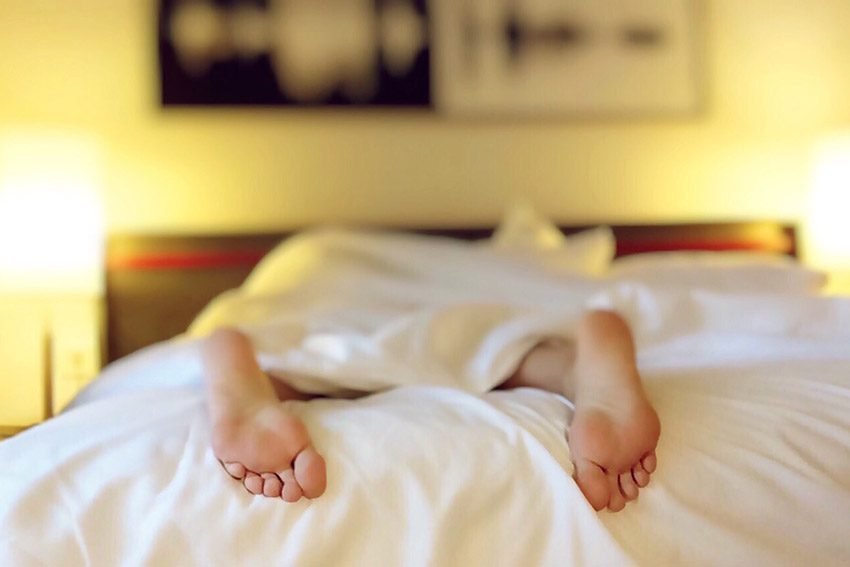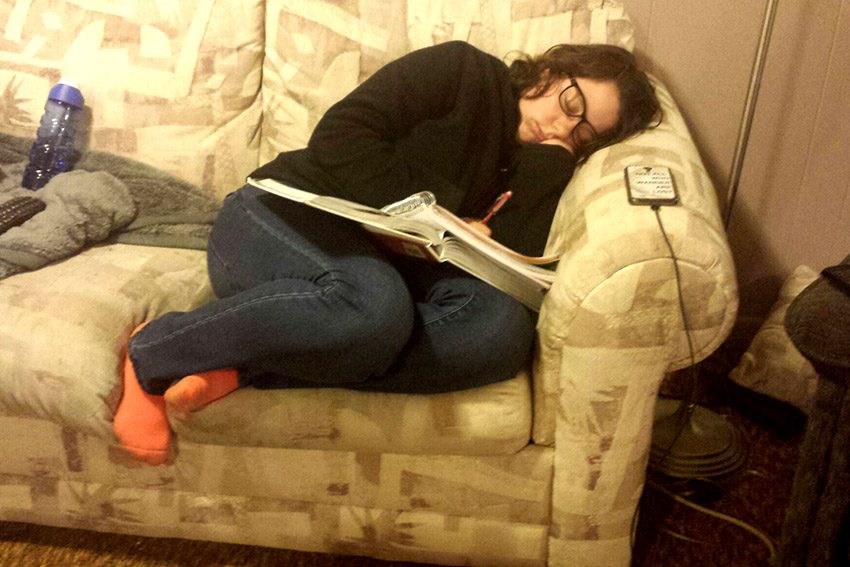19 Ways to Improve The Quality of Your Sleep

I didn’t sleep much last night. Again. It’s a regular occurrence for me. On a good night, I may sleep between four and six hours. On a bad night? Maybe just an hour or two. Insomnia sucks.
But apparently I’m not alone in my lack of sleep. Approximately one in four Americans develop insomnia each year. About 75% of them get over it within a relatively short period. It may take some work but there are ways you can increase the number of hours you sleep as well as ways to improve the quality of your sleep.
Interestingly, though I sleep well below the recommended adult average of seven to nine hours, I am technically not considered an insomniac. My lack of sleep does not impact my ability to function during the day. I rarely nap—or need one. And, to be honest, I cannot remember a time in my life when I slept more than I do now. Even in my childhood, I often lay awake for long periods of time each night. And the term morning person would be an understatement. I almost never sleep beyond sunrise, no matter the time of year.
That’s not the case for most people. Insomnia is one of the biggest productivity killers around. Studies show that moderate to severe insomnia can result in 50% or more productivity loss. This means that all-nighters are NOT going to make you more productive or more successful.

Since I am constantly told my short sleep cycle is unhealthy (it’s not; I’m just weird), I have tried many things over the years to increase the time I sleep or failing that, to improve the quality of my sleep. I’ve tried nearly every non-prescription sleep aid that’s been on the market in the last 40 years (none worked for me; your success may vary). Prescription meds aren’t a place I’m going to go since I don’t react like most people to many prescription medications, making me reluctant to take anything that isn’t critical to my health.
This means I rely on non-medical or non-medicinal means to improve the quality of my sleep. Since I don’t get a lot of it, I need to make all of my sleep minutes count. To that end, here are 19 different methods I have tried over the years that have helped me sleep better. Some of them I still use from time to time when I start to not feel as rested in the morning as I’d like.
19 Ways to Improve The Quality of Your Sleep
Track your sleep patterns.
Start by keeping a simple journal. Note what time you go to bed and what time you wake up in the morning. Note when you’re waking up during the night, and how long you’re staying awake. This may help you to identify sleep issues. Also, if you know why you woke up (like noises, children, pets or a snoring sleep partner), note that.
Listen to your body. Learn your rhythm.
Pay attention to your body. Are you by nature a morning person or a night owl? Not what you’ve decided you want to be, but what does your natural rhythm look like? Do you push yourself to stay up late? Do you pride yourself on how few hours you sleep?
Learn Your Sleep Needs.
After you’ve done the first two, try this exercise to allow your body to tell you how much sleep it needs.
- Set aside a week or so when you can focus on your sleep and not have interruptions in your sleep schedule. This probably needs to be a vacation or break period.
- Select a bedtime and keep to it every night during this exercise.
- Allow yourself to sleep in as long as you want, awakening without an alarm clock in the morning.
- After a few days, you will have recovered any sleep debt, and you begin to approach your average needed sleep.
- Once you know this, you can set a bedtime that will allow you to sleep as much as you need, and get up in time for your daily schedule.
Go to bed when you’re sleepy.
This seems obvious, but many of us force ourselves to stay up when our bodies want to sleep, creating a disruption in our sleep cycles.
Get a physical.
If your insomnia is persistent, is affecting your life, or isn’t getting better, go visit your doctor and make sure there isn’t an underlying medical condition affecting your ability to sleep. In some cases, you may need a sleep study to rule out conditions such as sleep apnea.
Establish a consistent bedtime and wake-up time.
Establishing regular times for sleeping and waking can help your body find its rhythm.
Get up when you can’t sleep.
Lying in bed tossing and turning or staring at the ceiling isn’t going to help you sleep. As a rule of thumb, once I hit the 30-minute mark, I get up and go find something to do that will help me relax and get sleepy again. For me, it’s generally reading, though I have to avoid really interesting books or I’ll stay up all night.
Figure out your alternative strategies.
Sometimes when I can’t sleep at night, if I go out and lie on the couch to read or listen to soothing music or an audio book, I can fall right back to sleep. I don’t know why, but the change of location seems to interrupt the insomnia. If you have an alternative place to relax it may help you fall asleep when you’re struggling.
Limit napping.
A brief nap during the “sleepy point” of your day can be beneficial. But it should be no more than 30 minutes. Longer naps can leave you feeling groggy and can interfere with your ability to fall asleep or stay asleep at night.
Get off your devices in the evening.

I resisted this one forever. I both work and relax with my computer. But I have found that turning off my computer and putting away the tablet and phone at least an hour before bed helps me to unwind and be able to fall asleep. For those evenings when I really want to read on my tablet, I have found that these Blue Blocker reading glasses help.
Avoid eating late, especially large meals.
Late night dinners can definitely affect your sleep. Putting your body to work digesting a large meal can keep you from sleeping.
Avoid stimulants like sugar, nicotine and caffeine. And check your medications?
If you aren’t sleeping and you’re relying on coffee or caffeinated soda to keep you going, you may be shooting yourself in the foot. Try to avoid these stimulants at least while you’re working on improving your sleep. If you aren’t ready to give them up entirely, focus on not using them after noon to allow them to cycle out of your system before bedtime.
Some medications can also interfere with sleep. If this may be the case for you, talk to your doctor about when you should take them to avoid sleep disruption.
Avoid alcohol. While it may be initially relaxing, it interferes with the sleep cycle.
I haven’t tried this personally because I don’t drink alcohol. However, every sleep expert I’ve researched gives this same advice. If you’re using alcohol to unwind in the evenings, you’re contributing to your insomnia. Try cutting it out or at least cutting back to only once or twice a week and see if it makes a difference for you.
Exercise regularly.
Regular exercise definitely helps. If it’s a vigorous workout, it should be at least four hours before bedtime. Other forms of exercise (see below) can be done in the evenings without disrupting sleep.
Try yoga or another pre-bedtime relaxation routine such as meditation or warm baths.

Yoga and Tai Chi are exceptions to the not exercising just before bed rule. They are both known to relieve stress and help you relax. For others, a nightly soak in the tub helps. Meditation is another excellent way to unwind. I have trouble getting my brain to slow down at night, and I have found meditation to be one of the best ways to disrupt “runaway brain” syndrome.
Make your bedroom a restful place.
Make your bedroom a place of relaxation. If possible, remove your desk and any work-related items. Declutter. Physical clutter can create mental and emotional clutter and keep you from relaxing. Room-darkening shades or curtains, a comfortable bed with comfortable pillows, and bedding that feels good and relaxes you will all help.
Use your bed for its intended purpose and nothing else.
Your bed is for sleeping (and sex). Using it as an alternate workspace, dining room table or anything else can send a message to your mind that it is not a place for sleeping and relaxation.
Journal your worries away.
Are you like me and, when you lie down at night your brain suddenly remembers everything you didn’t get done today, everything you need to do tomorrow, and everything that you’ve every worried about in your entire life? Grab a notebook and start doing a nightly brain dump before bed. Write down all those thoughts and worries. Write everything that pops into your head without judging it or analyzing it. Once you’ve got it all out of your system, you may find it easier to sleep.

Ban the pets from your bed.
I know. You all hate me now. You love your furry friends. I love mine too. But they don’t get to sleep in my bed. For the record, neither did my children when they were little—and sometimes I only tolerate my husband. I sleep better without being poked, prodded or sprawled on in the night, and apparently some research bears this out. According to sleep.org, there are some downsides to sharing your bed with your pets. If you are experiencing insomnia, try changing this—even if it’s only temporarily, and see if it might help you sleep better.
If you really want to improve the quality of your sleep, try one or more of these strategies and see if they make a difference for you. Is there something not on my list you’ve tried? I’d love to hear what has worked or hasn’t worked for you. Leave me a comment or connect with me on Facebook or LinkedIn.







